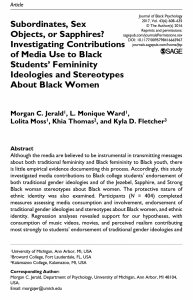Shaping Sexual Behaviors & Sexual Scripts
Subordinates, Sex Objects, or Sapphires?
 Full Article Name: Subordinates, Sex Objects, or Sapphires? Investigating Contributions of Media Use to Black Students’ Femininity Ideologies and Stereotypes About Black Women
Full Article Name: Subordinates, Sex Objects, or Sapphires? Investigating Contributions of Media Use to Black Students’ Femininity Ideologies and Stereotypes About Black Women
Open Access: No
Abstract
Although the media are believed to be instrumental in transmitting messages about both traditional femininity and Black femininity to Black youth, there is little empirical evidence documenting this process. Accordingly, this study investigated media contributions to Black college students’ endorsement of both traditional gender ideologies and of the Jezebel, Sapphire, and Strong Black woman stereotypes about Black women. The protective nature of ethnic identity was also examined. Participants (N = 404) completed measures assessing media consumption and involvement, endorsement of traditional gender ideologies and stereotypes about Black women, and ethnic identity. Regression analyses revealed support for our hypotheses, with consumption of music videos, movies, and perceived realism contributing most strongly to students’ endorsement of traditional gender ideologies and stereotypes about Black women. However, students with a strong sense of ethnic belonging were buffered from many of the negative influences of media use on these gender beliefs. The findings highlight the importance of considering culture-specific ideologies when examining links between Black students’ media use and gender beliefs.
Citation
Jerald, M. C., Ward, L. M., Moss, L., Thomas, K., & Fletcher, K. D. (2017). Subordinates, sex objects, or sapphires? Investigating contributions of media use to Black students’ femininity ideologies and stereotypes about Black women. Journal of Black Psychology, 43(6), 608–635. https://doi.org/10.1177/0095798416665967
